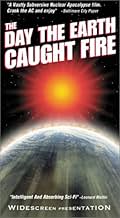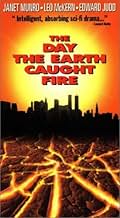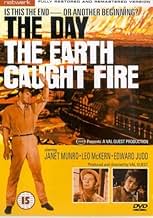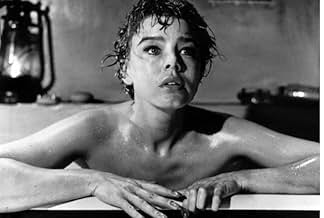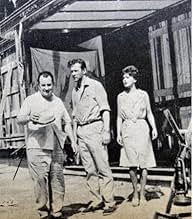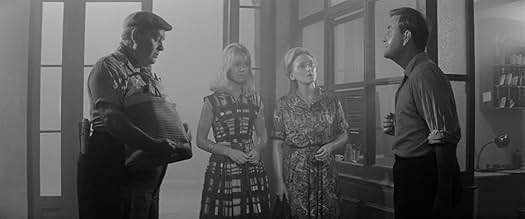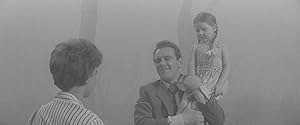O Dia em Que a Terra se Incendiou
Adicionar um enredo no seu idiomaWhen the U.S. and Russia unwittingly test atomic bombs at the same time, it alters the nutation (axis of rotation) of the Earth.When the U.S. and Russia unwittingly test atomic bombs at the same time, it alters the nutation (axis of rotation) of the Earth.When the U.S. and Russia unwittingly test atomic bombs at the same time, it alters the nutation (axis of rotation) of the Earth.
- Direção
- Roteiristas
- Artistas
- Ganhou 1 prêmio BAFTA
- 1 vitória e 1 indicação no total
- Constable
- (não creditado)
- Mother
- (não creditado)
- 1st Sub-Editor
- (não creditado)
- Policeman
- (não creditado)
- Printer in Printroom
- (não creditado)
- Copy Desk
- (não creditado)
- Copy Boy
- (não creditado)
- Man at Water Station
- (não creditado)
- Direção
- Roteiristas
- Elenco e equipe completos
- Produção, bilheteria e muito mais no IMDbPro
Avaliações em destaque
I had to do a double take to check that this film was actually made back in 1961, it is well and truly ahead of its time, and over sixty years on, it still packs an almighty punch. It feels more 1980's, it put me in mind of Threads, it has that very realistic, bleak vibe. Don't expect the typical 60's love story, there's a romance, but it's far from tropical of the time.
It's so interesting, the end of the world, but not seen through the eyes of a lead character, but scene from the point of view of the press, it's so interesting.
Made during the years of The Cold War, a time where people had genuine anxieties about nuclear weapons, and possible fallout.
Very clever camera work, the main body of the film is in black and white, in wide-screen, the opening sequences use warmer sepia tones to show the future earth, you can almost feel the arid heat.
The visuals are so impressive for its time, they made great use of the facilities on hand, the foggy bus trip, the cyclone and various disaster scenes all look wonderfully effective.
Edward Judd, Leo McKern and Janet Munroe are all excellent, I cannot fault a single performance.
A very impressive movie. Two hours pass by very quickly.
9/10.
Judd plays his character a little roughly, but that is to be understood, given his problems with his divorce and visitation with his young son.
Leo McKern's dialogue and facial expressions are superb and create the perfect persona of the seasoned veteran science writer who interprets and unravels the mystery for us.
Janet Munro, who died prematurely in her thirties gave a very acceptable performance for a young starlet, who keeps reporter Pete Stenning (Judd) at bay, then feeds him the critical information that blows open the story. I have two copies - One I taped from TV in the 80's, and another that I bought new. My sci-fi collection wouldn't be complete without it.
The film's greatest strength is in its understated, matter-of-fact presentation of the characters' various reactions to the relentlessly deteriorating situation. The performances are consistently honest and compelling, from the principal players down to the smallest walk-on parts. The award-winning script by Wolf Mankowitz is at times almost too clever for its own good. If there is one criticism that may be leveled against it, it is that most real people are not that consistently witty. Occasionally they are at a loss for words. Occasionally they say things that are lame, stupid, and altogether inappropriate. And this is the one element that was pretty much absent from the dialogue.
In an age when movies are being strangled to death by their own special effects, and character development often does not extend beyond the crudest bodily functions and four-letter expletives, it is genuinely refreshing to return to a film such as this one. Not only does it not rely on visual effects to tell its story, it is really so little dependent on the visual that it could have been equally successful as a radio drama (a forgotten art form nowadays), and might very well have caused an even greater panic than Orson Welles' "War of the Worlds."
Você sabia?
- CuriosidadesAs the Earth heats up, Bill McGuire asks for information on the melting point of "everything from steel to my glass eye". Leo McKern had a glass eye.
- Erros de gravaçãoIn the movie, several people in North London contract "typhus" from contaminated water. Evidently the script confused "typhus" and "typhoid fever." Typhus is spread by parasites, such as fleas or mites; not contaminated water. Typhoid fever can be spread by contaminated food or water.
- Citações
Peter Stenning: So Man has sown the wind - and reaped the whirlwind. Perhaps in the next few hours, there will be no remembrance of the past, and no hope for the future that might have been. All the works of Man will be consumed in the great fire out of which he was created. But perhaps at the heart of the burning light into which he has thrust his world, there is a heart that cares more for him, than he has ever cared for himself. And if there is a future for Man - insensitive as he is, proud and defiant in his pursuit of power - let him resolve to live it lovingly; for he knows well how to do so. Then he may say once more: Truly the light is sweet; and what a pleasant thing it is for the eyes to see the Sun.
- Cenas durante ou pós-créditosThere are no end credits whatsoever (not even a "The End" caption); merely a fade to black.
- Versões alternativasAlthough listed as cut by the BBFC, the then censor John Trevelyan passed the film uncut according to his memoirs. The 'X' certificate was given due to the subject matter, and occasional tough language, being unsuitable for anyone under the age of 16. Video and DVD releases are now rated PG.
Principais escolhas
- How long is The Day the Earth Caught Fire?Fornecido pela Alexa
Detalhes
- Data de lançamento
- País de origem
- Idioma
- Também conhecido como
- The Day the Earth Caught Fire
- Locações de filme
- Empresa de produção
- Consulte mais créditos da empresa na IMDbPro
Bilheteria
- Orçamento
- £ 200.000 (estimativa)
- Tempo de duração
- 1 h 39 min(99 min)
- Proporção
- 2.35 : 1



